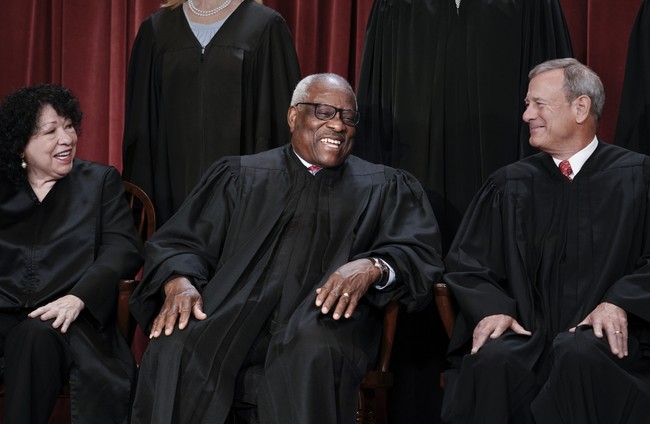
Precisely as I had repeatedly predicted. The only surprise here, and it’s only a mild surprise, is that the court ruled unanimously against Colorado in its attempt to disqualify Donald Trump over his supposed status as an insurrectionist. The nine justices took this so seriously, in fact, that it issued the decision per curiam. Even the concurrences simply amplify the arguments in the ruling, although the liberal wing’s concurrence takes exception to their scope.
In other words, the nine justices want to make sure this lesson in constitutional law sticks, and that the decision in Trump v Anderson offers no purchase for any more nutty theories about the 14th Amendment. And even more as expected, none of the justices offered any opinion on Trump, his actions on January 6, or his status as an alleged “insurrectionist” … because that was unnecessary.
As I also predicted, the court offered a brief history lesson to remind everyone that the 13th, 14th, and 15th Amendments exist to limit states’ powers, not to add to them:
This case raises the question whether the States, in addition to Congress, may also enforce Section 3. We conclude that States may disqualify persons holding or attempting to hold state office. But States have no power under the Constitution to enforce Section 3 with respect to federal offices, especially the Presidency. …
The respondents nonetheless maintain that States may enforce Section 3 against candidates for federal office. But the text of the Fourteenth Amendment, on its face, does not affirmatively delegate such a power to the States. The terms of the Amendment speak only to enforcement by Congress, which enjoys power to enforce the Amendment through legislation pursuant to Section 5.
This can hardly come as a surprise, given that the substantive provisions of the Amendment “embody significant limitations on state authority.” Fitzpatrick v. Bitzer, 427U. S. 445, 456 (1976). Under the Amendment, States cannot abridge privileges or immunities, deprive persons of life, liberty, or property without due process, deny equal protection, or deny male inhabitants the right to vote (without thereby suffering reduced representation in the House).See Amdt. 14, §§1, 2. On the other hand, the Fourteenth Amendment grants new power to Congress to enforce the provisions of the Amendment against the States. It would be incongruous to read this particular Amendment as granting the States the power—silently no less—to disqualify a candidate for federal office.
The liberal wing of the court issued its own concurrence on the broad question of states’ rights and authority. But they complain that the court went too far in its isolation of relief to Congress alone. A federal conviction on a charge of insurrection — a statute currently in place by Congress’ actions — should allow Section 3 to be self-executing, they argue:
Section 3 marked the first time the Constitution placed substantive limits on a State’s authority to choose its own officials. Given that context, it would defy logic for Section 3 to give States new powers to determine who may hold the Presidency. Cf. ante, at 8 (“It would be incongruous to read this particular Amendment as granting the States the power—silently no less—to disqualify a candidate for federal office”).
That provides a secure and sufficient basis to resolve this case. To allow Colorado to take a presidential candidate offthe ballot under Section 3 would imperil the Framers’ vision of “a Federal Government directly responsible to the people.” U. S. Term Limits, 514 U. S., at 821. The Court should have started and ended its opinion with this conclusion. …
Ultimately, under the guise of providing a more “complete explanation for the judgment,” ante, at 13, the majority resolves many unsettled questions about Section 3. It forecloses judicial enforcement of that provision, such as might occur when a party is prosecuted by an insurrectionist and raises a defense on that score. The majority further holds that any legislation to enforce this provision must prescribe certain procedures “‘tailor[ed]’” to Section 3, ante, at 10, ruling out enforcement under general federal statutes requiring the government to comply with the law. By resolving these and other questions, the majority attempts to insulate all alleged insurrectionists from future challenges to their holding federal office.
That is a valid point, one I have been making all along. Congress has already acted on Section 5 by making “insurrection” a federal crime. It rarely if ever gets charged and tried, but it does exist and serves Section 3 in practical terms. If someone commits an insurrection and gets convicted of that federal crime defined by Congress, then Section 3 should be self-executing in regard to that specific person. However, no one has even charged Trump with that crime, let alone convicted him of it — and it’s not as if prosecutors are shy about charging Trump.
Justice Amy Coney Barrett issued a separate concurrence that offers some soft support for this argument, although only in two paragraphs. She emphasizes, however, that the real story here is their unanimity in regard to state action on Section 3:
Particularly in this circumstance, writings on the Court shouldturn the national temperature down, not up. For present purposes, our differences are far less important than our unanimity: All nine Justices agree on the outcome of this case. That is the message Americans should take home.
This should put an immediate halt to efforts in other states to use the 14th Amendment to block Trump from the ballot. No doubt it will also prompt a hue and cry from the activist press that tried to promote this ahistorical and constitutionally absurd strategy as somehow brilliant and necessary to Save The Republic. Get prepared for a full-scale attack on the court regardless of Barrett’s reminder about the unanimity of the court in shutting this politically motivated stunt down for good.










